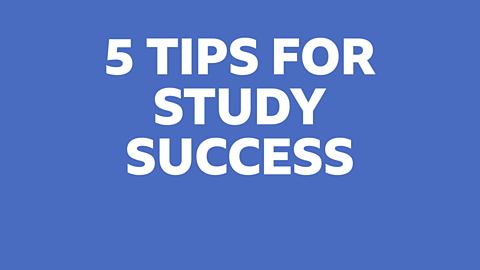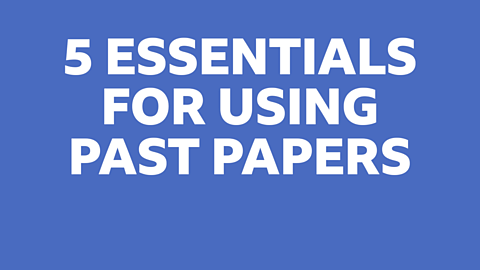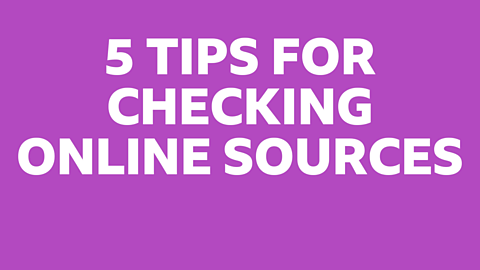There are some simple dos and don'ts in life – do remember your pleases and thank yous, don't look directly at the sun, don't go swimming just after eating… If you follow these rules then you'll get along great… Exams are much like life. We've asked our exam veterans for their top dos and don'ts to help you get through your exams.
Watch this video for some simple advice from people who've been to the exam gift shop and got the t-shirt, or, if reading is more your thing, then you can scroll down for a recap of the tips.
Amy: I've got some expert tips. It's three do's and three don'ts for your exams.
Daachi: Do tell me what they are.
Amiga: Sometimes the simplest rules are the best, especially when you've got your head full of revision, so hit me with some easy do's, and don'ts.
Dylan: Alright, let's do this. Do get enough sleep, eat a sensible diet, exercise and stay hydrated and otherwise look after yourself.
Amiga: A lot of students struggle with this. They stay up really late to revise. If you don't get enough sleep you'll get nervous and stressed and you won't have enough energy for the exam.
Dylan: I completely agree. I think I fell asleep in almost every one of my mocks, but not in any of my real exams, so that was good.
Daachi: Making sure you eat properly. And don't live off unhealthy food, exercise regularly and drink loads of water too. It's all part of making sure the best version of you is there when it comes to exam day.
Amy: Yeah, totally. Ok, next tip.
Daachi: Do stop and reset if your mind goes blank during your exam
Amy: My mind went blank a lot when I was doing my English exam. In the middle of a sentence I just forgot everything, but thankfully I had written out a plan at the beginning, had all of my ideas laid out. So when my mind did go blank I was able to look back and pick up right where I left off in the middle of a sentence.
Amiga: Sometimes I would get so excited that I knew the answer, then all of a sudden I would forget it. Sometimes I would have to take my time, close my eyes and come back to it. Soon, it brings it all back.
Dylan: If my mind goes blank I would fold the corner of the question I'm on, close the paper look at the time,tell myself to not worry. And then open the paper again and start the question as if I hadn't seen it before.
Daachi: Another tip please.
Amy: Do keep an eye on the time.
Dylan: My school had a large projector with a clock on it with the start and finish time of the exam, you can hardly miss it. Make sure you can see the clock from where you're sitting.
Daachi: Make sure you've planned out how much time you want to spend on each question and make sure you stick to it. You probably timed yourself doing some past papers or you can always use the rule of dividing the number of minutes in the exam by the number of marks in the paper. A sixty minute exam with sixty marks should give you one mark per minute. But don't forget to allow for reading time. Don't worry. You've done it before. You'll be fine.
Dylan: Right. Next, please.
Amiga: Don't focus on what other people are doing.
Amy: Everyone works at a different pace and everyone's thought process is different. Some people plan and some people write straightaway.
Amy: Only focus on what you're doing in that moment and make sure you're not looking around the exam room, no cheating.
Daachi: Sometimes people have filled pages and I've just written a few sentences but it's quality, not quantity. They could've written pages of absolute nonsense.
Amy: People might have just been writing what they want for dinner.
Daachi: Right. Next, please.
**Amy:**Don't just close your paper when you finish.
Check through your answers instead.
Dylan: Have a read of what you've done and check that you're happy with your answers. See if there's anything else that springs to mind when you look at it again with fresh eyes. Maybe you couldn't remember some equation, half an hour ago. But looking at it again might jog your memory.
Amiga: I'm very guilty of rushing through my papers. But you might as well use the time to re-read because once you're outside that exam hall, it's too late. That said, it's all about balance. Sometimes you can read things, so much that you start to doubt your answers and lose confidence. So don't give up straight away, but also know when to stop.
Amy: Okay, last one.
Daachi: Don't dwell on the exam once it's finished. Just move onto the next.
Amiga: It's very simple. Once you've finished with the exam, just continue with where you're going. Don't focus with what you've just done because it will drive you crazy. Everyone will want to talk about what they put down for their answers. But don't think about it, just focus on you.
Dylan: I had a print out of my exam timetable and when I was finished with an exam I would just cross it out. When I'd finished all the exams from a subject I'd get my revision books and give them to my mum to hide.
Amy: Teachers find it hard to let exams go too. I mean my teacher was stood right outside the exam hall and as soon as we came out they were like what was on the exam papers, tell us how you answered the questions. At the end of the day you just need to let it go and focus on what's coming next.
Daachi: So, do sleep enough. Do stop and reset. If your mind goes blank and do keep an eye on the time.
Amy: Don't focus on what other people are doing. Don't just close your paper and don't dwell on the exam once it's finished.
Daachi: So don't do all the don'ts. But do do all their do's. Is that right?
Amy: I think so. Do do all the do dos.

Dos and Don'ts
Do
Look after yourself Get a good night's sleep on the run up to your exams, but especially the night before your exam. For some tips on how sleep can help you study, watch this video. Eating a sensible diet, exercising and staying hydrated can all help with tackling your exams, so make sure you take good care of yourself on the run up to, and during your exams. Check out this guide on how to keep a good study-life balance as your exams approach.
Stop and reset If your mind goes blank during an exam, it's perfectly fine to take a moment to regain your composure and get yourself back on track. If you do go completely blank in an exam, then try not to dwell on it, fold the corner of your exam paper at the point where you got stuck, then if you have time at the end, come back to that question.
Keep an eye on the time There should be a large clock in the exam room – make sure you can see it from where you're sitting. At the start of your paper, you can plan how long you want to spend on each question. Our top tip is to divide the time you have for your exam by the amount of marks in your paper, so sixty marks in one hour is one minute per mark – but make sure to allow enough time to make your plan, read the paper and to check your answers at the end.
Don't
Focus on other people Everyone works in different ways and at a different pace. Some people plan while others start writing straight away. There's no point looking around at what other people are doing – just focus on your paper and putting your best effort into it. This is the only thing you can affect.
Close your paper when you've finished Once you're happy that you've answered as much of your exam as you can, if you've got time, go back through all of your answers before the exam finishes. Don't just close your paper and daydream about what you're having for lunch. You might just think of an answer that you forgot earlier, or maybe you'll notice a spelling mistake. But it's important to know when to put your pen down – you can sometimes make too many tweaks and start second-guessing yourself. It's all about balance.
Dwell on your last exam You can't change what's happened in the past, so once you leave the exam hall, try not to think about what you could have done differently. Instead, put all your energy into focusing on your next exam. If you do think that you made a mistake on your last paper then learn from it, and make sure you don't make the same mistake on your next exam!

If you need support
You should always tell someone about the things you’re worried about. You can tell a friend, parent, guardian, teacher, or another trusted adult. If you're struggling with your mental health, going to your GP can be a good place to start to find help. Your GP can let you know what support is available to you, suggest different types of treatment and offer regular check-ups to see how you’re doing.
If you’re in need of in-the-moment support you can contact Childline, where you can speak to a counsellor. Their lines are open 24 hours a day, 7 days a week.
There are more links to helpful organisations on BBC Action Line.

If you want some more useful exam tips and guidance, then we've got loads of amazing advice to help guide you through exam season on the pages below, what are you waiting for? Give them a tap!

5 tips for study success
Hold on to your hats as we're about to give you a whirlwind guide on how to study for success.

5 essentials for using past papers
Find out what our exam veterans have to say about all things past papers and discover the benefits of using them.

5 tips for checking online sources
We've asked our exam survivors for their advice when checking the validity of an online source when doing coursework.
